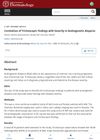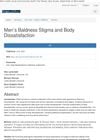 1 citations,
February 2021 in “International Journal of Research in Dermatology”
1 citations,
February 2021 in “International Journal of Research in Dermatology” Premature graying of hair significantly harms psychological and social wellbeing.
Aesthetic rehabilitation techniques can improve life quality and wellbeing for disabled patients.
[object Object]  2 citations,
January 2021 in “JAAD Case Reports”
2 citations,
January 2021 in “JAAD Case Reports” Using a special laser and skin medication together successfully cleared a skin condition in a pregnant woman.
 1 citations,
November 1983 in “The Lancet”
1 citations,
November 1983 in “The Lancet” Acute leukemias with the Philadelphia chromosome may be biphenotypic, and identifying this is important for proper treatment.
January 2023 in “Pharmaceutics” AA–TF#15 significantly promotes hair regrowth and could be an effective treatment for androgenic alopecia.
 18 citations,
June 2019 in “Clinical research in dermatology”
18 citations,
June 2019 in “Clinical research in dermatology” Acne can't be cured but can be managed with treatments like benzoyl peroxide and diet changes; it's costly and can lead to scarring and mental health issues.
 7 citations,
January 2017 in “American Journal of Biological Anthropology”
7 citations,
January 2017 in “American Journal of Biological Anthropology” Sardinians were historically short due to a mix of genetics and factors like disease and poor nutrition, but recent height increases suggest better living conditions had a bigger impact.
 9 citations,
October 2018 in “Journal of Cosmetic and Laser Therapy”
9 citations,
October 2018 in “Journal of Cosmetic and Laser Therapy” Using methods like lasers and microneedling with drugs can improve hair regrowth for alopecia, but more research is needed on safety and best practices.
 218 citations,
January 2013 in “The Lancet Oncology”
218 citations,
January 2013 in “The Lancet Oncology” Chemotherapy causes hair loss by damaging hair follicles and stem cells, with more research needed for prevention and treatment.
[object Object]  April 2024 in “International journal of women's health”
April 2024 in “International journal of women's health” Adult female acne is a complex condition that can worsen with menopause, requiring holistic treatment and tailored skincare at different life stages.
 May 2023 in “Research Square (Research Square)”
May 2023 in “Research Square (Research Square)” Shi-Bi-Man activates hair follicle stem cells and promotes hair growth by changing lactic acid metabolism and other cellular processes.
 September 2024 in “Indian Journal of Dermatology”
September 2024 in “Indian Journal of Dermatology” Trichoscopy effectively diagnoses and assesses the severity of androgenetic alopecia.
 24 citations,
January 2015 in “International Journal of Trichology”
24 citations,
January 2015 in “International Journal of Trichology” Early balding in young Indian men may indicate a higher risk of metabolic syndrome and potential heart disease.
 1 citations,
July 2023 in “Chinese Medicine”
1 citations,
July 2023 in “Chinese Medicine” Shi-Bi-Man, a Traditional Chinese Medicine, helps grow hair by boosting lactic acid metabolism and activating hair follicle stem cells.
 1 citations,
May 2022 in “Pharmaceutics”
1 citations,
May 2022 in “Pharmaceutics” Tea seed oil in nanostructured carriers stimulates hair growth and feels less greasy when applied.
 May 2023 in “Journal of Ethnopharmacology”
May 2023 in “Journal of Ethnopharmacology” The wild garlic plant, Allium macrostemon Bunge, can promote hair growth and could potentially be used to treat hair loss.
17 citations,
May 2019 in “Journal of International Medical Research” Xiaoaiping reduces chemotherapy side effects and improves quality of life for breast cancer patients.
4 citations,
September 2021 in “Sensors” LED therapy can safely and effectively regrow eyebrows in people with frontal fibrosing alopecia.
 December 2022 in “BMC women's health”
December 2022 in “BMC women's health” The CNC® prosthetic system improved body image in breast cancer patients with hair loss from chemotherapy but did not significantly change their psychological wellbeing.
 50 citations,
December 2010 in “Bjog: An International Journal Of Obstetrics And Gynaecology”
50 citations,
December 2010 in “Bjog: An International Journal Of Obstetrics And Gynaecology” South Asian women with PCOS experience more psychological distress and have a poorer quality of life, especially in social relationships, with hirsutism affecting them more than obesity.
 February 2021 in “International journal of men's social and community health”
February 2021 in “International journal of men's social and community health” Bald men's facial expressions are seen more negatively, and many men are dissatisfied with their bodies, including hair loss.
 22 citations,
October 2017 in “Australian & New Zealand Journal of Obstetrics & Gynaecology”
22 citations,
October 2017 in “Australian & New Zealand Journal of Obstetrics & Gynaecology” Many young Australian women think they have PCOS, but only a few are diagnosed correctly, causing unnecessary worry.
 8 citations,
March 2019 in “Progress in Human Geography”
8 citations,
March 2019 in “Progress in Human Geography” Hair significantly shapes body identity and social interactions, influencing how we perceive and relate to our bodies.
 58 citations,
January 2018 in “International Journal of Women's Dermatology”
58 citations,
January 2018 in “International Journal of Women's Dermatology” Alopecia significantly lowers women's quality of life, with psychological and social challenges, highlighting the importance of early treatment and support.
 March 2024 in “World Journal Of Advanced Research and Reviews”
March 2024 in “World Journal Of Advanced Research and Reviews” Educators who survived COVID-19 faced physical, psychological, and social challenges but overcame them with resilience and support, highlighting the need for schools to provide better health and psychological care.
 January 2017 in “Acta dermato-venereologica”
January 2017 in “Acta dermato-venereologica” The congress showed that psychological therapy can help skin condition patients, social media affects acne stigma, education improves atopic dermatitis, and patient satisfaction in dermatology is high, especially with good doctor engagement.
 September 2023 in “IP Journal of Nutrition, Metabolism and Health Science/IP Journal of Nutrition Metabolism and Health Science”
September 2023 in “IP Journal of Nutrition, Metabolism and Health Science/IP Journal of Nutrition Metabolism and Health Science” Recognizing and managing hirsutism, alopecia, and acne is crucial for improving wellbeing in women with PCOS.
 June 2024 in “Skin Health and Disease”
June 2024 in “Skin Health and Disease” Men with alopecia often feel less confident and have lower wellbeing, needing more support.
3 citations,
November 2021 in “Stress” Girls had higher stress hormone levels during school due to social and emotional issues, while boys had higher overall hormone levels with slight changes when school started.
 30 citations,
September 2020 in “Journal of Patient-Reported Outcomes”
30 citations,
September 2020 in “Journal of Patient-Reported Outcomes” Alopecia Areata (AA) causes significant emotional distress, including feelings of embarrassment, depression, and anxiety, and impacts social interactions and daily activities.

























